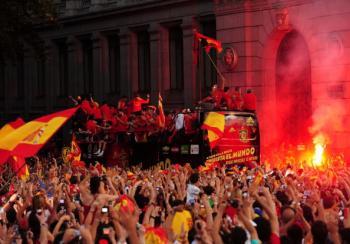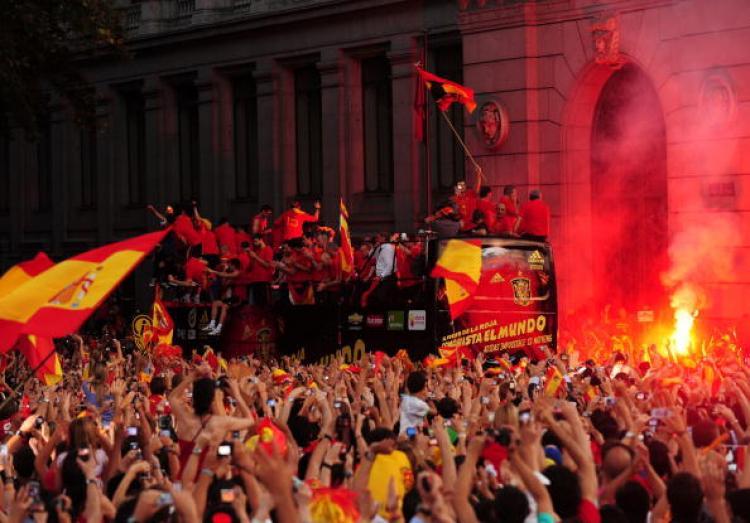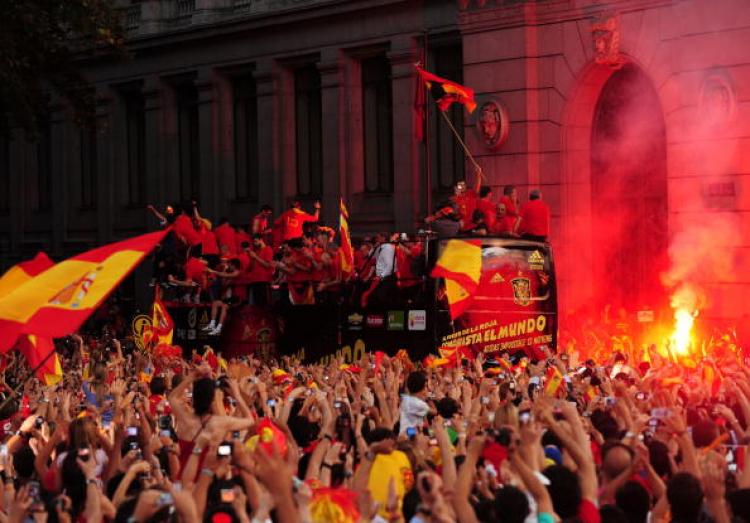Just a few days after winning the most valuable soccer trophy—The World Cup—Spain is feeling the vibrations of excitement and positivism, as the streets are full of people celebrating and cheering their country’s first ever win.
Economists predict that the euphoria generated by the win could lift Spain out of crisis and propel the country to an economic growth of 0.7 percent by the end of the year.
The burst of excitement has temporarily overshadowed the gloomy economic reality that Spain is facing today. The economy shrank 3.6 percent in 2009 and is set to shrink another 0.4 percent in 2010. The unemployment rate is as high as ever, stretching to over 20 percent.
Before the World Cup, many economists predicted Spain’s collapse to be similar to that of Greece, but with a lot more repercussions, since it is the European Union’s fifth largest economy.
The good news is that all those woes may be healed by the magic wand of soccer.
“It generates confidence in our country, here and abroad, and that will also be good for GDP,” Spain’s Finance and Economy Minister Elena Salgado told reporters this week, saying that the World Cup “is good” for the country.
Miguel Angel Fraile, who is the head of the Spanish Commerce Confederation, representing around 450,000 retailers, said that “consumption will certainly rise, but we don’t know by how much,” according to an AFP interview.
“When a society is happy, that always has repercussions on consumption,” he said.
After the last World Cup 2006 in Germany, ABN Amro Bank did a study—called “Soccernomics”—on how the world’s biggest soccer competition affected the participants.
“A World Cup winner enjoys an average economic bonus of 0.7 percent additional growth, while the losing finalist suffers an average loss of 0.3 percent compared to the previous year,” said the “Soccernomics” report.
According to statistics in the report, the 1986 World Cup winner—Argentina—recorded a stunning 7.1 percent economic growth. Germany (the 1990 winner) posted a 5.7 percent growth, Brazil (1994 and 2002 winner) posted 5.9 and 2.7 percent growth, respectively. The previous winner in 2006—Italy—posted a 2 percent economic growth for the rest of the year.
The reasons for higher economic growth of the winning countries are centered around higher consumer spending, increased tourism, and a presence of a “feel-good” factor that gives confidence to consumers. Consumers will certainly buy sports merchandise, souvenirs, clothes, and other goods and services.
Spain, being the third most visited country by tourists in the world—after United States and France—is feeling rejuvenated after the win as a more confident tourism industry welcomes tourists to its famous places such as Barcelona, Madrid, Seville, and of course the islands of Mallorca and Ibiza.
“There are many good things in Spain, but the most important is football,” said the coach of Spanish national team, Vicente del Bosque. “Football is the locomotive for all things in the country.”
Economists predict that the euphoria generated by the win could lift Spain out of crisis and propel the country to an economic growth of 0.7 percent by the end of the year.
The burst of excitement has temporarily overshadowed the gloomy economic reality that Spain is facing today. The economy shrank 3.6 percent in 2009 and is set to shrink another 0.4 percent in 2010. The unemployment rate is as high as ever, stretching to over 20 percent.
Before the World Cup, many economists predicted Spain’s collapse to be similar to that of Greece, but with a lot more repercussions, since it is the European Union’s fifth largest economy.
The good news is that all those woes may be healed by the magic wand of soccer.
“It generates confidence in our country, here and abroad, and that will also be good for GDP,” Spain’s Finance and Economy Minister Elena Salgado told reporters this week, saying that the World Cup “is good” for the country.
Miguel Angel Fraile, who is the head of the Spanish Commerce Confederation, representing around 450,000 retailers, said that “consumption will certainly rise, but we don’t know by how much,” according to an AFP interview.
“When a society is happy, that always has repercussions on consumption,” he said.
After the last World Cup 2006 in Germany, ABN Amro Bank did a study—called “Soccernomics”—on how the world’s biggest soccer competition affected the participants.
“A World Cup winner enjoys an average economic bonus of 0.7 percent additional growth, while the losing finalist suffers an average loss of 0.3 percent compared to the previous year,” said the “Soccernomics” report.
According to statistics in the report, the 1986 World Cup winner—Argentina—recorded a stunning 7.1 percent economic growth. Germany (the 1990 winner) posted a 5.7 percent growth, Brazil (1994 and 2002 winner) posted 5.9 and 2.7 percent growth, respectively. The previous winner in 2006—Italy—posted a 2 percent economic growth for the rest of the year.
The reasons for higher economic growth of the winning countries are centered around higher consumer spending, increased tourism, and a presence of a “feel-good” factor that gives confidence to consumers. Consumers will certainly buy sports merchandise, souvenirs, clothes, and other goods and services.
Spain, being the third most visited country by tourists in the world—after United States and France—is feeling rejuvenated after the win as a more confident tourism industry welcomes tourists to its famous places such as Barcelona, Madrid, Seville, and of course the islands of Mallorca and Ibiza.
“There are many good things in Spain, but the most important is football,” said the coach of Spanish national team, Vicente del Bosque. “Football is the locomotive for all things in the country.”






